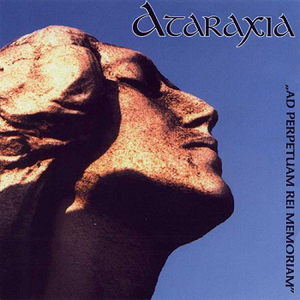1) Ataraxia was a pseudon… Read Full Bio ↴There are multiple artists named Ataraxia:
1) Ataraxia was a pseudonym used by experimental electronic musician Mort Garson only on his 1975 album "The Unexplained: Electronic Musical Impressions of the Occult".
2) Ataraxia, formed in 1985, is a neofolk / neoclassical band from Modena and Reggio Emilia, Italy, that combines modern technology with archaic instrumentation over various media. They describe their music as a cross "between sacred and profane, ethereal and neoclassic, contemporary and early music." Their work has often involved research into European legends and Classical mythology. Contemplation, dreamy experiences, elegiac atmospheres, ritual movements float in a mysterious garden where contemporary textures of notes meet the embracing echo of classic sounds. Their lyrics are written in many ancient and contemporary languages (such as Latin, French, German, English, and their native Italian) as they try to bring to the surface the hidden treasures and revelations of each. Many of their performances take place in locations the band professes to possess specific spiritual qualities. Since their beginnings in the late 1980s, they have recorded over 20 original LPs every one presenting its own original concept. To name just a few, La Malédiction d'Ondine (1995) deals with female spirits of water and earth; while “Llyr” (2010) tells the story of a divine being traveling through times and forms. Their last work Quasar (2020) is dedicated to 7 archangelic archetypes.
Some of their earlier long sold-out albums have been recently re-released with numerous bonus-tracks.
Band line-up:
Francesca Nicoli - vocals, flute, lyrics
Vittorio Vandelli - classic guitar, chitarra battente
Giovanni Pagliari - keyboards, piano
Riccardo Spaggiari - drums and percussions (darbouka, tar, caxixi, ghaval, daf, etc)
Official website: http://www.ataraxia.net/
MySpace: http://www.myspace.com/atarassia
Facebook: http://www.facebook.com/pages/Ataraxia/13823036507?ref=ts
3) Ataraxia is a metal band from Woodcliff Lake, NJ, United States. http://www.reverbnation.com/ataraxia1
4) Ataraxia is a metallic crust band from Ruzomberok, Slovakia.
https://ataraxiark.bandcamp.com
https://www.facebook.com/ataraxiark
5) Ataraxia is a folk band from Germany.
Band line-up:
Herbert Storjohann - Acoustic Guitar, Blues Harp, Lead Vocals, Mandolin
Frank Ostersehlt - Backing Vocals, Keyboards
Klaus Gärtner - Flute, Backing Vocals, Acoustic Bass
Zweistimmenstäuschung
Ataraxia Lyrics
Jump to: Overall Meaning ↴ Line by Line Meaning ↴
Er ist so mude geworden, da? er nichts mehr halt
Nichts mehr halt seinen Blick auf d'e
Stabe und keine Welt hinter den Staben keine Welt.
Sie Blick ist vorubergehen der Stabe so mude geworden,
Da? er nichts mehr halt.
Ihm ist, als ob es tausend Stabe keine Welt.
Ich aber schwanke fort oben.
Der Tod geht uns nichts an,
Denn solange wir sind, ist der Tod nicht da;
Und wenn er einmal da ist,
Sind wir nicht mehr
The lyrics of Ataraxia's "Zweistimmenstäuschung" are introspective and melancholic, dealing with themes of weariness, detachment, and mortality. The opening lines, "Nichts mehr halt, nicht mehr halt" (Nothing holds anymore, holds anymore) suggest a sense of exhaustion and resignation, as if the singer has lost their grip on the world around them. The next lines, "Er ist so müde geworden, dass er nichts mehr halt" (He has become so tired that he holds onto nothing anymore), further emphasize this feeling of weariness and suggest that the singer has given up trying to hold onto anything.
The following lines take a surreal turn, as the singer reflects on the image of "Stabe" (rods or sticks) that hold nothing behind them. The singer's gaze is drawn to these sticks, but they offer no meaning or coherence. The repetition of "keine Welt" (no world) emphasizes the singer's sense of detachment and alienation from the world around them. The lines "Ihm ist, als ob es tausend Stabe keine Welt" (It seems to him as if there are a thousand sticks and no world) convey a feeling of overwhelming confusion and disorientation.
The final lines of the song deal with the theme of death, but in a somewhat ambiguous way. The phrase "Es ist leider kein Tod, sondern die ewigen Qualen des Sterbens" (It is not death, but the eternal pains of dying) suggests that the singer is not yet dead but is experiencing a kind of prolonged death. The singer seems to be struggling with the idea of mortality, as the line "Der Tod geht uns nichts an" (Death does not concern us) suggests a sense of detachment from death. However, the last line "Und wenn er einmal da ist, sind wir nicht mehr" (And when it is here, we are no more) acknowledges the finality of death.
Line by Line Meaning
Nichts mehr halt, nicht mehr halt.
Lost all grip, lost all grip.
Er ist so mude geworden, da? er nichts mehr halt
He has become so tired that he can no longer hold on to anything.
Nichts mehr halt seinen Blick auf d'e Stabe und keine Welt hinter den Staben keine Welt.
No longer able to focus on the bars, and no world beyond the bars, no world.
Sie Blick ist vorubergehen der Stabe so mude geworden, Da? er nichts mehr halt.
His gaze passes over the bars, the bars he can no longer hold on to.
Ihm ist, als ob es tausend Stabe keine Welt.
To him it's as if there are a thousand bars and no world.
Ich aber schwanke fort oben.
I, however, sway above.
Es ist leider kein Tod, sondern die ewigen Qualen des Sterbens.
It's not death unfortunately, but the eternal agony of dying.
Der Tod geht uns nichts an, Denn solange wir sind, ist der Tod nicht da; Und wenn er einmal da ist, Sind wir nicht mehr.
Death doesn't concern us, as long as we exist, death is not with us; and when it does come, we're no longer here.
Lyrics © O/B/O APRA AMCOS
Lyrics Licensed & Provided by LyricFind
